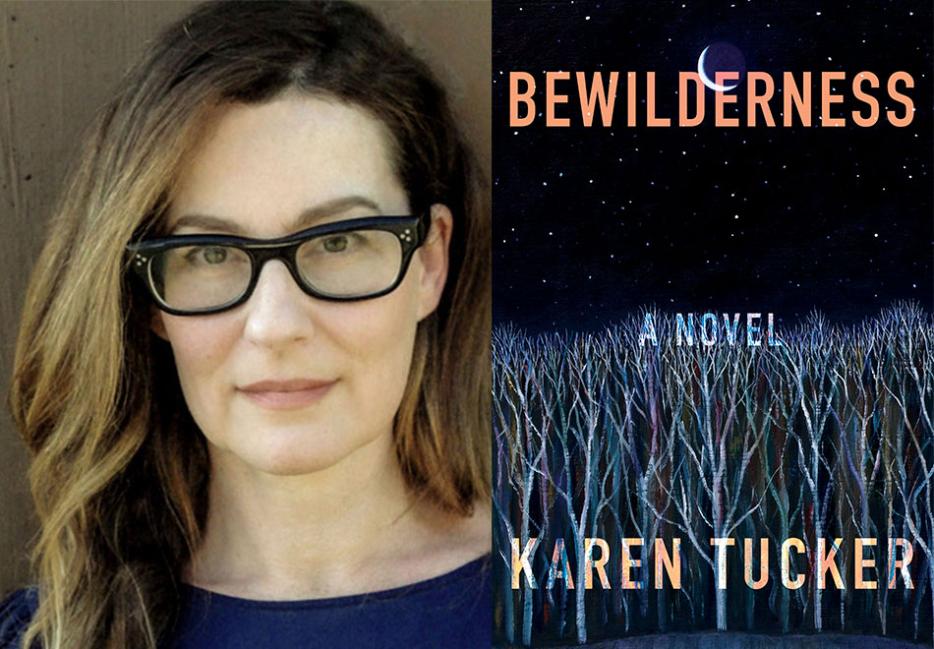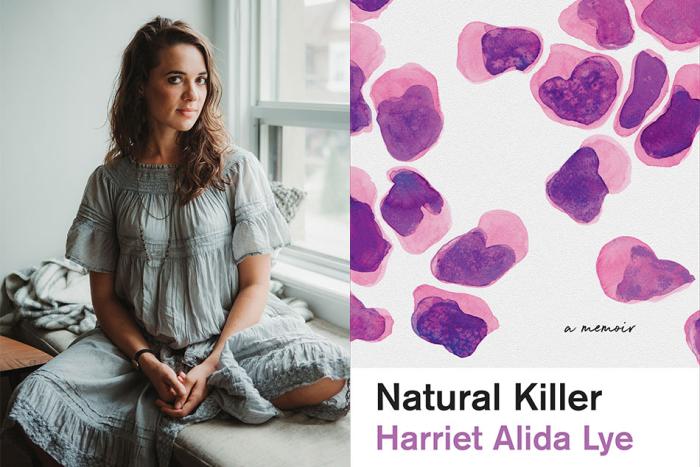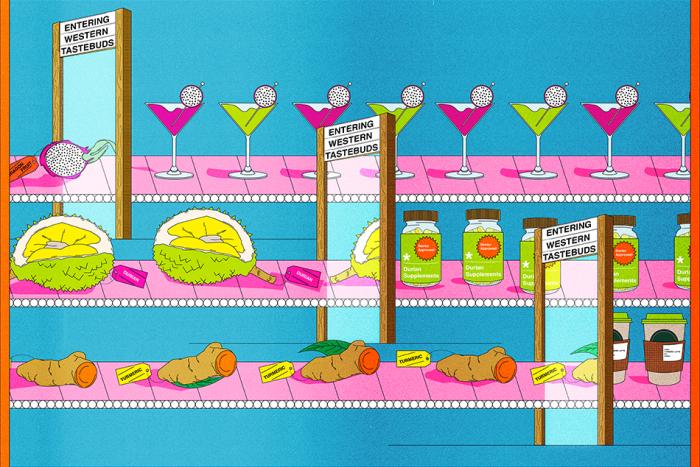Stuffed into a tattered green and white Winnie–the-Pooh folder and stored at the back of my cupboard are hundreds of letters all written by one person: my high school best friend. On ruled sheets, inside handmade cards, on sketching paper, we wrote each other constantly: on our single beds, under pine trees, during chapel service, even while sitting at adjacent desks. Some things are too difficult to say out loud, and when you’re a teenage girl, almost everything feels a little bit too difficult.
The letters, then, were our confession, our shared diary, and most of all, an evolving document of how hard we clung to each other. At 17, I’d never loved anyone as much, and at 33, I suspect I never have since. As Karen Tucker writes, “It was like the song of her head had become stuck on a loop in my head.”
In Tucker’s debut novel Bewilderness (Catapult) we follow the story of Luce and Irene, teenage best friends hustling to survive—and get high—in rural North Carolina. Perched “at the edge of a strange, enchanted forest,” the girls forge their bond by walking into the dazzling woods of opioid addiction hand-in-hand and stay there until Luce decides to get clean, leave town, and start a new life with her boyfriend.
Moving seamlessly from the girls’ first wild forays to their later, less bewitching consequences, Bewilderness’s stark prose runs at an even keel—an almost startling lack of sentimentality that nonetheless finds sweetness in unlikely places and reveals pain in far too many others. As lives continue to fracture under the weight of a rigged game, Irene reflects: “I’ve heard it said the system is fucked, but the way I see it, it’s working the exact terrible way they planned all along “
Ultimately, though, Bewilderness reads as a story of friendship—which, as a teenager, is also the story of who you are. As Irene says, “As long as Luce was around, you knew you’d be alright.”
So what happens if she isn’t? I have hundreds of handwritten letters that all attest to the same thing: no teenage girl ever wants to know the answer to that question.
Richa Kaul Padte: Karen! It’s weird because there are so many things I wanted to ask you that felt personally relevant, but I realized while preparing for our chat that most of those questions would involve an immense betrayal of people I love—including at least one who is “no longer with us” (as Bewilderness’s dedication reads). Betrayal is a thread that runs through your text, and I’m wondering, can storytelling itself be a kind of betrayal if the story isn’t yours?
Karen Tucker: Hey, how about I be really annoying and say both yes and no?
In the no column: I'm reluctant to police storytellers in any fashion, and that includes making any sort of claim about who gets to tell what story. Flap your wings, storytellers, fly free! Because while freedom comes with risks—including the risk that certain individuals will take advantage—it seems to me the larger risk arrives whenever we introduce even the tiniest seeds of surveillance and patrolling into our culture. They never evolve into anything but tyranny.
I’m also suspicious of the whole ownership angle. Aren't owners typically people with more resources and advantages, and therefore more power? Does that mean only the most central, most powerful person in a given story should be able to share their perspective? My favourite stories are told by people with little tangible power—people who might be said to exist in the periphery. Bewilderness is narrated by a part-time food server from a low-wage community, and was written by an underpaid grad student/former career food server. I don't own the story of the opioid epidemic and I certainly don't have any power in that realm, but I also don't want to read Purdue Pharma's version of the narrative unless it comes from a court transcription.
Now I'm all worked up and I can't remember what was in the yes column.
Thank you for that question. I'm sorry the story felt personally relevant. I'm with you, and you're not alone.
A lot of pop culture in this genre works hard to explain the “whys” of drug use: trauma, poverty, childhoods, etc. But in your book, you never provide these big, almost cathartic explanations. We get glimpses of the characters’ pasts, but finally, it is what is, and the only context is now. What led you to this approach?
A lack of knowledge. If I had any answers, I would have done the book and myself a huge favour and shared them. People like answers—they're so easy to file away and ignore!
But questions are pesky creatures. They always burrow into the most uncomfortable places and ride around with you as you go about your business, taking toothy little nips every so often, reminding you of their existence. Until harm reduction strategies become standard practice and people are no longer dying of substance use disorder, we could all stand to have those whys nipping meanly at our hide.
It feels to me sometimes that harm reduction is moving in a one step forward two steps back kind of way—not just in the U.S., but around the world. On the one hand, there’s growing public awareness around the rights and autonomy of marginalized people, while on the other, you get legislation like FOSTA/SESTA that snatches away those rights in one fell swoop (in that case, of online sex workers the world over). Where do we go from here?
It's absolutely baffling that harm reduction—an approach to substance use disorder that focuses on keeping individuals alive—is ever met with resistance. Once someone suffers a fatal overdose, the chance for them to achieve better health in the future has gone up in smoke. Yet all over the U.S., efforts to establish safe needle exchanges fail due to political and community opposition; fentanyl test strips and Narcan remain costly and hard to come by; methadone and buprenorphine programs continue to be elusive, particularly for people in Black and brown communities; and safe injection sites, despite their proven success rates in other countries, and despite support from Sanders and Warren, are still illegal.
Until drug use is decriminalized and these harm reduction tools are cost-free and accessible to all, here are some U.S. resources: Find Narcan here. Get Fentanyl test strips and kits here. Find needle exchanges here. Each of us also needs to interrogate our own biases against individuals with substance use disorder, educate ourselves about this medical condition, and fight for policy and health care changes at all levels of government.
I feel like I’m about to ask you a question that’s the equivalent of people asking me about Bollywood, so, apologies in advance! I grew up on a mountain in Southern India, in a residential school established by American missionaries, so there was a lot of country music in my childhood. And your home—the Blue Ridge Mountains—seemed like a glorious idyll (our school literally had its own version of John Denver’s “Country Roads”). Is this . . . weird to you? I feel like Luce and Irene would be rolling their eyes right now.
Ah, the Blue Ridge Mountains are glorious! The Uwharrie Mountains are glorious. The Smokies, all of it. Luce and Irene have plenty of stuff to roll their eyes at, and American missionaries would probably be on that list, but not the landscape of their youth. If anything, the North Carolina mountains might be one of the last good mysteries remaining.
I’m so glad my childhood fantasies remain intact!
Something that struck me was that even though Irene and Luce have smartphones, the internet doesn’t feel woven into their lives the way it often is in contemporary fiction (and existence). They use it, but it never feels essential, a part of their identity. Why?
I love your distinction between usage and identity. I never thought of it that way! Because yes, they do use phones quite a bit: texting friends for rides because their licences have been suspended, posting on Reddit and watching YouTube videos, reading a friend's obituary, researching methods for quitting illicit substances, including cold turkey and tapering strategies, texting dealers, calling out sick, looking up Florida rehabs, and more.
But you're right, their phones do feel more like a tool and not a reflection of who they are or hope to become. There's no self-promotion or personal branding. No profiles are being curated. Their usernames on social media are anonymous IDs.
A big reason for that anonymity stems from the fact that in the U.S., the behaviours that often accompany substance use disorder are criminalized. Funny how some people can cause the death of so many others and never face jail time—members of the Sackler family would be a prime example—while others suffer incarceration and/or lose their own families, even their lives, for falling into the trap the wealthy and powerful have laid in an effort to further increase their wealth and power.
At the same time, even with anonymous social media IDs and the twelve-step practice of using first names only, it's important to remember that Irene and Luce have in no way escaped surveillance. For many of us, they might appear to be little more than figures in an annual CDC report, but all over this country vast quantities of dollars are being made off vulnerable individuals and communities. Unscrupulous rehab facilities and the for-profit prison system are always looking for ways to add to their coffers. The seeds of tyranny bloom again.
I really loved the bits of Bewilderness that take place on Reddit. It’s such a vast world in there, but I’ve rarely seen it included in literary landscapes. r/opioids is where Luce and Irene often end up, and you do such a great job of representing how those threads unfold—the way feelings and comments move in a chaotic way online. Irene says: “I only wanted some advice, maybe a little support in the process, but the responses that came in got me even more freaked out and angry.” So many of us have had this experience, yet we still turn to the internet for advice, right?
Much like chemists in labs who rearrange molecules to create illicit substances, social media developers engineer their products to be highly addictive and highly profitable. Anyone compelled to scroll through their phone, despite knowing the harmful effects this activity produces, is succumbing to the same impulses as someone compelled to ingest a risky pill or powder. We all love our little dopamine hits.
We'd also all do well to remember that the next time we glance up from our screen and pass silent judgment on someone nearby who appears to be in active addiction.
There’s this very intense feeling I used to have as a teenager of wanting my friends to be mine and mine alone, of not wanting to share them with anyone else. And I love the way you explore that, because this possessiveness is usually attributed to romantic relationships, not friendships. Is it healthy that we often grow out of these intense feelings about our friends? I can see how it might be, but it also feels somewhat like a loss.
It is, it is a loss! Probably what we've gained outweighs what's been taken, but that doesn't mean there's no lingering hole.
It wasn't until recently, when people began to ask me about the friendship that Luce and Irene experience, that I started to understand why it came out that way on the page. I wrote this story as a lonely non-traditional grad student. While I found a few wonderful friends during my years in Florida, it wasn't enough to tamp down that painful longing for more, more. It brought me back to those old, sad, grabby feelings of childhood. That possessiveness you mention. When nothing can ever be enough.
And if the medicine you need is scarce and hard to come by, chances are you'll have to get creative. Just like Irene and Luce find inventive ways to secure the painkillers they need to get away from what hurts them, I had to invent my own friendships to relieve my pain. For a while, the trick almost worked! And now, hello, I'm back at my desk.
Is the invention you’re talking about the work of writing Luce and Irene into existence—is Bewilderness itself the trick? What medicine are you fashioning at your desk now?
Right now, I'm brewing up a story about full-service sex work, though I probably won't know until well after I've finished what led me to this particular trick.






